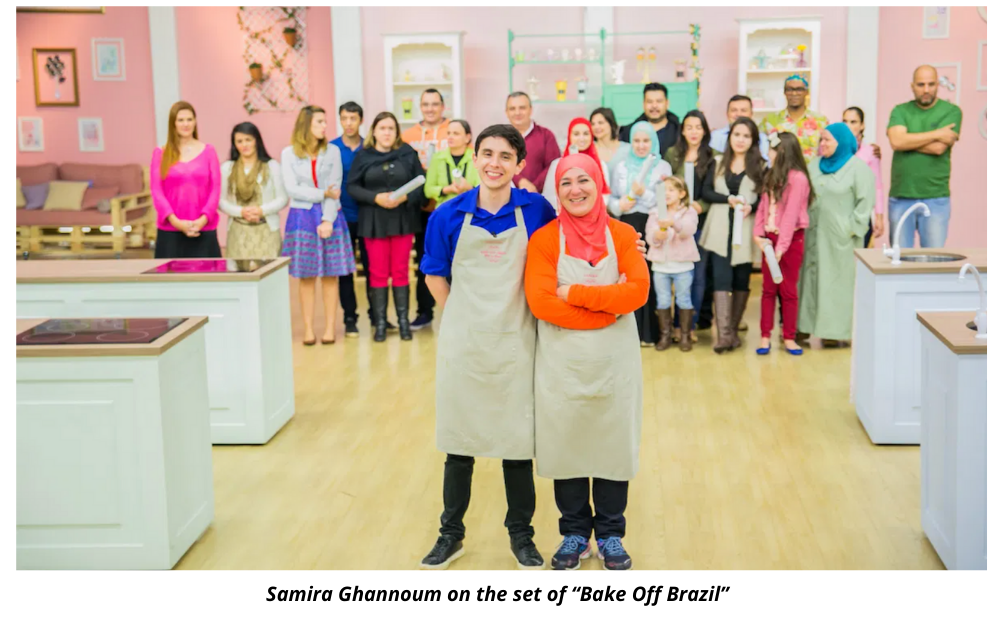Photo Credit @:
MiddleEast Monitor
A Lebanese Brazilian Muslim woman who won the first series of Bake Off Brasilin 2015 is now a well-known figure all over the country. Samira Ghannoum won the competition over 13 weeks watched by millions in 20 countries across Latin America.
“I am very happy to be the first Muslim woman of Arab descent to have won this competition,” she explained. In the final, she had just two hours to make a wedding cake. The programme attracted millions of viewers and apparently led many to learn more about Islamic and Arab culture.
Ghannoum lives in São Paulo with her Lebanese husband and five daughters. She made cakes and Arabic sweets for her family, friends and local community before being persuaded to enter the competition. “I have always liked to make confectionery,” she told me. “I was making cakes and sweets for my daughters to celebrate their birthdays, and when their friends saw this, they started asking me to make things for them.” It was one of her daughters who, in 2015, signed her up for Bake Off Brasil.
She remembers it being a very hard competition, but she was good enough to get through to the final. The programme’s presenter, Ticiana Villas Boas, and the judges told UOL, “Samira deserved the award without a doubt. She was the most constant, the one who made the least mistakes and the one who did the most delicious things. She was born with God’s gift and she has really the hands of a chef. It is clear that she does everything with a lot of love and commitment.”
Winning the competition was not a short-lived thing for Samira Ghannoum. She became an icon for other Muslim women in the world of Brazilian cooking and baking. “I had no idea that my participation in the programme could change the lives of other women. I have seen many Muslim girls who watched me on Bake off who are now bakers and confectioners themselves.”
Before taking part in the programme, Ghannoum explained to the producers and judges that as a Muslim there are limits on the ingredients she can use. In the final, however, one recipe needed alcohol. She refused to use it, even if it meant losing.
“It would have been against everything that I try to be as a Muslim,” she pointed out. “I never use any ingredients that are forbidden in Islam.”
When the judges asked the Italian chef who created the recipe about this, he replied, “The professional chef does not use alcohol in the recipe of this cake.”
Throughout the competition, Ghannoum didn’t taste any dish that was offered to her. Once the other competitors knew about the culinary restrictions, they respected her even more. There were even times when they warned her not to taste things because they contained wine. She was very grateful for the respect shown to her faith and culture in this way. “This respect unites us, despite our differences in religion,” she smiled.

According to Ghannoum, a woman who wears hijab is already spreading Islam without saying a word, because it arouses curiosity and prompts others to ask her about it. I have experienced this myself, and Islam teaches us to respect the law and show respect to our neighbours, whoever they are. It is very important to show that our Islam does not make us “aliens” as many people believe. Once this is explained and understood, respect and admiration follow.
Ghannoum told me that winning the competition didn’t make her any more special than other people. In fact, it places more responsibility on her shoulders.
“The other finalist tensed up and could not complete his recipe. I hurried up to help him. He cried and the audience and the evaluation committee thanked me for what I did. To me, this is what my Islam guided me to do.”
Samira Ghannoum is one of a growing number of Lebanese Brazilians who are successful in their chosen professions as well as active within their local communities across the country. She achieved her dream through this competition. As a winner of Bake Off Brasil, she published her first cookbook in partnership with the programme.
She has taken part in many events to publicise her book and her Islamic identity in Brazil. Today she has a large presence on social media which is a platform to introduce Islam to her fellow Brazilians. She has tens of thousands of followers.
“They regularly send a lot of questions and I answer them all. I am no longer just a baker and confectioner, but a symbol of Muslim women in Brazilian society.” That means a lot to her, and to her family and local community. And so it should.














